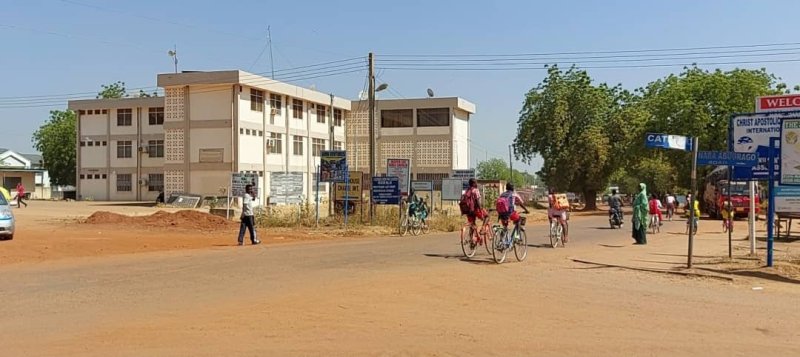
By Seade CAESAR
The rapid evolution of Islamic banking across the Gulf Cooperation Council (GCC) states comprising Saudi Arabia, United Arab Emirates, Qatar, Kuwait, Bahrain, and Oman has positioned the region as a global benchmark for Shariah-compliant finance.
Rooted in principles that prohibit interest-based transactions while promoting profit-sharing, risk reduction, and social justice. Islamic banking reflects values that strongly align with the financial inclusion and development goals of many African economies.
For African governments particularly Ghana, the GCC’s model offers a compelling blueprint for building ethical, inclusive, and resilient financial systems. By adapting the GCC experience, African nations can leverage Islamic finance to drive socio-economic transformation, expand development financing, and bridge financial access gaps through Shariah-compliant, risk-sharing mechanisms.
Historical Context
The historical development of Islamic banking in the Gulf Cooperation Council (GCC) states dates back to the early 1970s, driven by the region’s desire to align financial practices with Islamic principles. The establishment of the Islamic Development Bank in 1975 and the launch of Dubai Islamic Bank the same year marked pivotal moments in institutionalizing Shariah-compliant finance.
Over the decades, the GCC states have refined regulatory frameworks, expanded product offerings, and established global leadership in Islamic finance. This evolution was shaped by strong government backing, increasing public demand, and the rise of international standards, positioning the region as a model for others.
Understanding the GCC Model of Islamic Banking
The GCC countries Saudi Arabia, United Arab Emirates (UAE), Bahrain, Kuwait, Qatar, and Oman have successfully mainstreamed Islamic banking through robust regulatory frameworks, state-backed support, and public trust in Shariah-compliant finance. The core features of their model include:
Interest-free Financing (Riba-free)
Islamic banking in the GCC prohibits the charging of interest (riba), a concept rooted in Islamic jurisprudence. Instead, banks earn profit through trade-based transactions, leasing, and equity participation. This fosters fairness, discourages exploitation, and aligns lender-borrower interests, ensuring that finance is tied to real economic activity and mutual benefit.
Asset-backed Transactions
GCC Islamic banks require all financial transactions to be linked to tangible assets such as property, commodities, or equipment. This discourages speculative behavior and ensures that finance supports productive activities. Asset-backing provides transparency, reduces systemic risk, and aligns financial transactions with the real economy, strengthening economic stability and accountability.
Ethical Investment Mandates
Investments made through Islamic banking in the GCC must comply with Shariah principles, excluding industries deemed unethical, such as alcohol, gambling, pornography, and weapons. This ethical screen promotes social responsibility, environmental consciousness, and moral investing, creating a finance ecosystem that balances profitability with societal values and long-term sustainability.
Risk-sharing Structures
Unlike conventional banking where lenders bear minimal risk, Islamic banking promotes risk-sharing through contracts like mudarabah (profit-sharing) and musharakah (partnership). Both parties contribute resources and share profits or losses. This cultivates partnership-based relationships, reduces borrower exploitation, and encourages careful investment decisions that benefit both parties equitably.
Global Financial Leadership
The GCC has emerged as a global leader in Islamic finance through strategic investments, international partnerships, and large-scale sukuk issuances. Cities like Dubai, Manama, and Riyadh serve as international Islamic finance hubs, influencing global standards and attracting cross-border investors seeking ethical and Shariah-compliant financial instruments with competitive returns.
Dual Banking Systems with Regulatory Clarity
GCC countries have effectively implemented dual banking systems where Islamic and conventional banks operate side by side under clearly defined laws. Dedicated Shariah governance frameworks, such as those in Bahrain and the UAE, ensure Islamic banks are regulated distinctly, fostering trust, legal certainty, and a level playing field for growth.
Major Institutions
Saudi Arabia – Al Rajhi Bank: Al Rajhi Bank is the largest Islamic bank globally, offering comprehensive Shariah-compliant services across retail, corporate, and investment sectors.
UAE – Dubai Islamic Bank & Abu Dhabi Islamic Bank: These banks are pioneers in modern Islamic banking, integrating fintech solutions and driving innovation in Shariah-compliant financial products and services.
Kuwait – Kuwait Finance House: Established in 1977, Kuwait Finance House is a global Islamic banking leader with operations across the Middle East, Europe, and Asia.
Bahrain – Bahrain Islamic Bank: Bahrain Islamic Bank, supported by a strong regulatory environment, serves as a financial innovation hub and key player in regional Islamic finance.
Qatar – Qatar Islamic Bank: Qatar Islamic Bank is the country’s largest Shariah-compliant institution, playing a major role in corporate finance, real estate, and sukuk issuance.
Oman – Bank Nizwa: Bank Nizwa, launched in 2013, leads Oman’s Islamic banking sector by offering diverse, ethical, and risk-sharing financial products nationwide.
The Islamic finance industry in the GCC is valued at over $1 trillion, with growth driven by demographic trends, government support, and investor preference for ethical finance.
Why Islamic Banking is Relevant for Ghana and African Economies
Enhancing Financial Inclusion
Islamic banking offers a viable alternative for millions of unbanked Africans, particularly in Muslim-majority communities, who avoid conventional banks due to religious reasons. By prohibiting interest and emphasizing ethical and participatory finance, it appeals to underserved populations. In Ghana, regions like the north can benefit significantly, expanding access to savings, credit, and investment without compromising religious beliefs.
Ethical and Socially Responsible Finance
Islamic finance emphasizes social justice, transparency, and the equitable distribution of wealth. It prohibits speculative activities and mandates investments in halal (permissible) sectors. Through instruments like zakat (almsgiving) and waqf (charitable endowments), Islamic banking inherently supports social welfare. For Ghana and Africa, this ethical approach aligns with efforts to promote responsible finance and community-centered development.
Mobilizing Development Finance
Islamic financial instruments, particularly sukuk (Islamic bonds), present an opportunity for governments to raise funds without accruing conventional interest-bearing debt. These instruments can finance infrastructure, health, education, and agriculture projects while attracting investors from the Middle East and Asia. Ghana and African nations can tap into this growing pool of Shariah-compliant capital for sustainable development goals and public investment.
Resilience and Stability
Islamic banks are generally more resilient to financial shocks due to their asset-backed structures and risk-sharing principles. They avoid excessive leverage and speculative derivatives, reducing systemic risk. For African economies vulnerable to external shocks and currency volatility, Islamic banking offers a more stable alternative. Ghana, in particular, can benefit from this model to build a more robust financial system.
Steps for Ghana and African Governments to Adapt the GCC Model
Policy and Legal Frameworks
Ghana and other African governments must develop comprehensive legal frameworks to legitimize and regulate Islamic banking. This includes passing Islamic Banking Acts or amending existing banking laws to accommodate Shariah-compliant finance. Clear regulations will foster investor confidence, promote transparency, and ensure that Islamic banks can operate on equal footing with conventional institutions within the financial ecosystem.
Establish Shariah Governance
Establishing robust Shariah governance is crucial. Governments should set up national or institutional Shariah advisory boards to oversee compliance with Islamic principles. These boards will guide product development, monitor banking operations, and resolve jurisprudential issues. Drawing from GCC models, such structures will ensure authenticity, consumer trust, and regulatory consistency in the implementation of Islamic financial services.
Capacity Building and Human Capital
To implement Islamic banking effectively, Ghana and African nations must invest in training professionals in Shariah finance, banking law, and product innovation. Partnering with GCC-based Islamic finance institutions can provide technical assistance, certifications, and curriculum development. Building a pool of qualified experts will strengthen domestic capacity, improve governance, and reduce reliance on foreign advisors for long-term sustainability.
Pilot with State Owned Banks
Introducing Islamic banking windows within state-owned banks such as ADB or GCB Bank offers a low-risk entry point. These pilots allow governments to test consumer demand, evaluate regulatory frameworks, and gradually scale up. It also signals commitment to inclusive finance and provides underserved communities with ethical banking options, ultimately fostering wider acceptance of Islamic financial principles.
Regional Integration
Harmonizing Islamic banking standards across regional blocs like ECOWAS will facilitate cross-border investment, enhance policy coordination, and support the creation of a pan-African Islamic finance ecosystem. Shared frameworks and mutual recognition of Shariah standards will attract international investors, foster innovation, and position Africa as an emerging frontier for Islamic finance modeled on successful GCC practices.
Policy Recommendations
Develop a Dual Banking Regulatory Framework
Ghana’s financial authorities should enact legislation that allows Islamic banks to operate parallel to conventional banks under distinct regulatory standards. This framework should outline licensing requirements, capital adequacy, reporting standards, and risk management practices aligned with Shariah principles, ensuring operational clarity, legal certainty, and investor confidence in Islamic banking operations.
Establish Shariah Advisory Boards
Every Islamic financial institution must be guided by a dedicated Shariah advisory board comprising Islamic finance scholars and legal experts. These boards will ensure all products, contracts, and operations comply with Islamic law. Their oversight builds consumer trust, mitigates reputational risk, and promotes consistency in interpretation and application of Shariah.
Invest in Talent and Public Awareness
Capacity-building is essential for Islamic banking success. Ghana should introduce academic programs, certifications, and workshops on Islamic finance for bankers, regulators, and legal practitioners. Simultaneously, nationwide awareness campaigns should educate citizens on the benefits of Shariah-compliant banking, debunk misconceptions, and promote inclusive access for Muslims and non-Muslims alike.
Consider Sukuk for Development Financing
Ghana can diversify its public financing toolkit by issuing Sukuk Islamic bonds backed by tangible assets. These instruments attract Gulf-region investors seeking Shariah-compliant assets. Proceeds can fund priority infrastructure such as roads, hospitals, and energy projects. Sukuk also help avoid interest-bearing debt, aligning with fiscal sustainability and ethical finance goals.
Conclusion
The GCC states have successfully institutionalized Islamic banking as a mainstream, modern financial system, offering practical models in regulatory innovation, financial inclusion, and ethical investing. Their experience demonstrates that faith-aligned finance can coexist with economic competitiveness, innovation, and long-term stability.
For Ghana and other African nations facing widespread financial exclusion, development financing gaps, and growing public disillusionment with conventional banking, adopting tailored versions of the GCC model presents a sustainable and inclusive alternative. With the right regulatory vision, institutional support, and public engagement, Islamic finance can not only enhance financial inclusion and diversify funding sources but also position Africa as the next frontier for Shariah-compliant, ethical financial systems.
Seade Caesar, is the Executive Director,Africa Global Policy and Advisory Institute
The post GCC States’ Islamic Banking: A model and standard appeared first on The Business & Financial Times.
Read Full Story






















Facebook
Twitter
Pinterest
Instagram
Google+
YouTube
LinkedIn
RSS